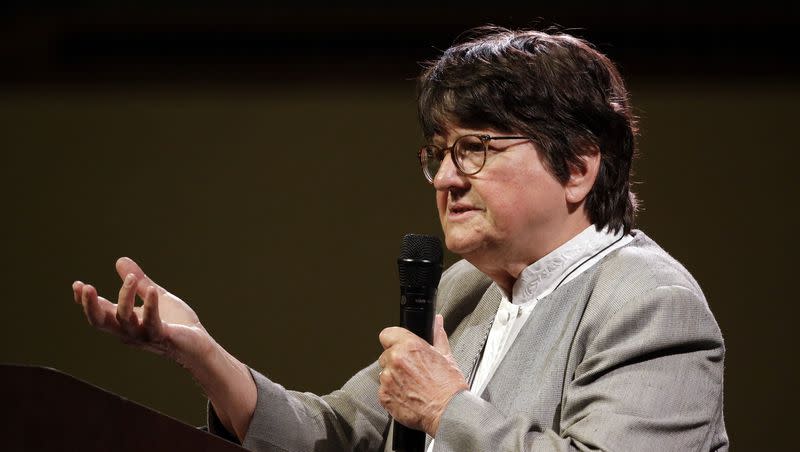Why a Catholic nun sued the Louisiana Board of Pardons

- Oops!Something went wrong.Please try again later.
- Oops!Something went wrong.Please try again later.
- Oops!Something went wrong.Please try again later.
- Oops!Something went wrong.Please try again later.
Sister Helen Prejean, a Catholic nun famous for her service to death row inmates, is taking her anti-death penalty activism to a new level in Louisiana.
This month, she filed a lawsuit against the state’s Board of Pardons, arguing that it violated Louisiana’s open meetings law last month when it held a “secret meeting” regarding applications for clemency.
Louisiana Gov. John Bel Edwards had asked the board to review applications from 56 people currently on death row and highlighted his desire to see their sentences commuted to life without parole, according to the Death Penalty Information Center.
Prejean argues that, at the September meeting in question, members of the Board of Pardons were working to subvert the governor’s request.
“Because the meeting was held in violation of the Open Meetings Law, it has deprived me of a chance to voice my opinion on these life-or-death considerations,” Prejean said on X, the site formerly called Twitter.
She continued, “I ask the courts to order openness and transparency in this life-or-death process and let the 56 people on death row have their chance to plead their cases for the clemency of life in prison.”
Related
Louisiana death row clemency applications
Prejean’s battle with the Louisiana Board of Pardons is complicated by the fact that there’s already a fight playing out for control of the state’s death row.
Although Edwards, who is a Democrat, can issue stays of execution, he does not have the authority under Louisiana’s state Constitution to commute the sentences of inmates on death row on his own.
To achieve that result he has to ask the Board of Pardons to consider applications for clemency, which he did in August, according to the Death Penalty Information Center. If the board recommends an inmate for clemency, Edwards can approve the change.
While the governor works to prevent future executions from happening, Louisiana Attorney General Jeff Landry, a Republican, is working to prevent the sentence commutations from taking place.
Landry, who is campaigning to be Louisiana’s next governor, has spoken out against Edwards’ anti-death penalty stance and accused him of wrongly interfering with the legal process.
“Edwards has been governor for nearly eight years; and now, in the waning days of his tenure, he is trying to circumvent the established legal process to commute the death sentences of Louisiana’s most heinous criminals,” Landry said in a statement.
He later took legal action to attempt to block the hearings on clemency applications from happening this month.
“The board of pardons should not sacrifice the rule of law, the rights of victims and the public’s participation simply to achieve the governor’s political objective,” he said in a statement on his court filings.
The board itself is the focus of Prejean’s new lawsuit because of its decision to compromise with Landry in the aftermath of his legal action.
“Prejean’s petition seeks to void the settlement that the board of pardons reached with Landry,” The Guardian reported.
As Prejean’s lawsuit plays out, the board of pardons is moving forward with the plan it adopted in consultation with Landry. It is holding administrative reviews on applications for clemency, instead of full hearings.
On Friday, the board began this review process by discussing five applications. It declined to schedule hearings for any of them, according to KALB news in Louisiana.
“If a case were to receive a green light to move forward from review to an actual hearing, there would be a 60-day delay. As it stands now, none of the cases would make it to a hearing if greenlighted before Edwards leaves office,” KALB reported.
Sister Helen Prejean biography
Although lawsuits on meeting rules don’t typically receive international press attention, Prejean’s did because of her prominence in the realm of anti-death penalty activism and faith-based advocacy more generally.
Prejean is best known for her book “Dead Man Walking” about her ministry to death row inmates. It was turned into a movie of the same name starring Susan Sarandon and Sean Penn in 1995. Sarandon won an Oscar for her portrayal of Prejean, according to IMDb.
Prejean was born in 1939 in Baton Rouge, Louisiana, and joined a religious community for Catholic nuns 18 years later, according to her website. After attending college and graduate school, she taught high school in New Orleans.
She was still in New Orleans in 1982 when she began corresponding with a death row inmate for the first time. She ultimately attended the execution of that inmate, Patrick Sonnier, two years later, SisterHelen.org reports.
Prejean’s experience meeting with Sonnier set her on the path that she’s still on today. She continues to meet with inmates, attend executions and call for an end to the death penalty in the U.S. and around the world.
“Over the decades, Sister Helen has made personal approaches to two popes, John Paul II and Pope Francis, urging them to establish the Catholic Church’s position as unequivocally opposed to capital punishment under any circumstances,” her website says. “Not long after meeting with Sister Helen in August of 2018, Pope Francis announced new language of the Catholic Catechism which declares that the death penalty is inadmissible because it is an attack on the inviolability and dignity of the person, with no exceptions.”
Prejean described what it’s like to be with death row inmates during their final moments in an interview with the Deseret News in 2021.
“I offer pure presence. I tell them to look at my face, the face of somebody that cares about you. Look up at the face of somebody who loves you. The face of somebody who seriously believes what is being done to you is morally wrong. I tell them they have value,” she said.

